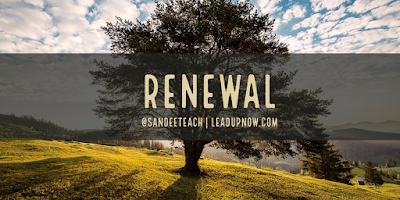Renewal. It means to make like new. Synonyms include words like restore implying returning to an original state after depletion, renovate as in repairing or rebuilding, and rejuvenate suggesting a restoration of youthful vigor, powers, or appearance. We renew library books, licenses, acquaintances, and vows. Holiday breaks renew our spirits; exercise renews our energy. Spring is the renewal of life after a long spell of winter. Our world is in a constant state of change and adaptation. Change comes in cycles of birth, growth, death, and renewal. Renewal is the acceptance of change.
John Goodlad said, “Most of us generally don’t pull up stakes and move simply because the paint on the windowsill starts to peel. And we don’t destroy our old garden and start over from scratch each time the blooms begin to fade. We do better when we exercise patience, ongoing care and while monitoring the effectiveness of that care, make adjustments where necessary. Such an approach, when applied to schooling, is what we call educational renewal.” In the words of John Goodlad, educational renewal is primarily designed for two purposes. First, renewal is to prevent current conditions from deteriorating and to address problems that arise. Secondly, school renewal aims to effect and sustain the changes that are desirable.
Educational renewal is never on a checklist as something that can be “done.” It is not a program, mandate, or initiative. It is not a mass produced package with instructions on how to fix problems by replacing what is currently happening in a school. Renewal is a way of being. School renewal includes all stakeholders- teachers, parents, secretaries, administration, custodians, librarians, students, bus drivers, etc. that collectively look at the school experience and inquire about what is working and what is not working. Everyone has a voice and ideas are shared on a regular basis. Alternatives to the status quo are examined, put into practice, and assessed to determine their impact. The responsibility for change lies with those who can and must make the changes and who will also be affected by the changes. In a school setting, renewal may look something like providing more support and training for literacy instruction rather than replacing a whole reading program. It is different than a reform. School renewal is more about the continuous tweaking of behaviors that over time lead to a greater transformation much like a gardener prunes, weeds, and tends to other tasks that nurture the plants within a garden. And just as the soil must be primed and ready for a fruitful garden, a school’s culture must be primed and ready for risk-taking, open discussion, and change.
Unfortunately, developing a school culture that fosters school renewal doesn’t happen quickly and easily. It takes a courageous leader to clearly articulate and communicate a shared vision. Leaders must model and embody the values that they want to instill in others. They must be resourceful and understand how resources and budgets can be used to influence change strategies. Strong leaders must develop leadership skills in others by identifying strengths and finding opportunities for their staff members to lead. They must examine data, determine next steps, and evaluate the impact of those next steps. Leadership for school renewal can’t just be positional if long-term changes are expected to take root. Teacher leaders can influence the thoughts and actions of their colleagues to improve their practices. A culture where renewal thrives is created when engaging in inquiry, and reflective behaviors is a norm.
One of the greatest responsibilities of leaders is to foster a strong sense of self-efficacy in teachers and the belief that their purposeful actions can make meaningful changes in the lives of their students. Leaders must trust their teachers and communicate the belief that collectively, SMART goals can be achieved. They instill hope despite the obstacles and empower their stakeholders to create the conditions that will make educators more successful. The optimism, confidence, and determination of great leaders to persevere are infectious. Strong visionary leaders passionately inspire their staff to focus on what students are to learn and be able to do. Feedback about each student’s progress is timely and ongoing so that teachers can use the embedded structures to give students more support. Professional learning communities provide timely feedback to each teacher regarding student learning in comparison to other students so that teachers can identify their strengths and weaknesses with instruction. A PLC becomes more than just another educational acronym. The school becomes a place focused on learning. The school and the people within the school improve simultaneously. The message of “We’re all growing, learning, and improving our ability to ensure that every student is learning” is loud and it’s celebrated!
An ancient Greek philosopher, Heraclitus, said: “There is nothing permanent except change.” As educators embrace the concept of renewal in their school, changes won’t seem so daunting. Those things that work and are valuable to a school community can be retained while at the same time promote the changes that will improve educators and their practices. Small consistent changes for improvement over time lead to a level of transformation and lasting effective change. Perhaps the most common metaphor for transformation is the metamorphosis of a caterpillar. Maya Angelou said, "We delight in the beauty of the butterfly, but rarely admit the changes it has gone through to achieve that beauty." Simultaneous educational renewal is a transformation that benefits all stakeholders as they change and grow together.


No comments:
Post a Comment